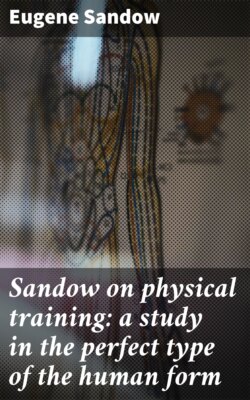Читать книгу Sandow on physical training: a study in the perfect type of the human form - Eugene Sandow - Страница 6
На сайте Литреса книга снята с продажи.
THE CONSUMMATE BEAUTY OF PHYSICAL FORM
ОглавлениеTable of Contents
for which the Greek—especially the Athenian athlete—was famed. Greek and Roman alike knew, in a high degree, the value of bodily exercise, and in their competitive games, as well as in their training for war, adopted a system of physical education which produced wonderful results. They knew nothing, however, of biology and the marvel of the body's cell-structure, the key which, it may be said, has opened to a modern age the doors of its microscopic vision and revealed almost the secret of life itself, with its ever-recurrent motions of waste and renewal. They did not know, as Mr. Archibald Maclaren, the great English authority on Physical Education, has observed, "that man's material frame is composed of innumerable atoms, and that each separate and individual atom has its birth, life, and death; and that the strength of the body as a whole, and of each part individually, is in relation to the youth or newness of its atoms. Nor did they know that this strength is consequently attained by, and is retained in relation to, the frequency with which these atoms are changed, by shortening their life, by hastening their removal and their replacement by others; and that whenever this is done by natural activity, or by suitable employment, there is ever an advance in size and power, until the ultimate attainable point of development is reached. They simply observed that the increased bulk, strength, and energy of the organ or limb is in relation to the amount of its employment, and they gave it employment accordingly."
This, in the main, was the sum of knowledge possessed by the ancients in relation to physical training; yet unscientific—as we now understand the term—as it was, its results were wonderful in promoting strength and activity. Of course, in giving themselves so ardently to physical education, the Greeks and Romans must have observed much else, as the results of muscular exercise, that was beneficial to the youth in training. Though they had little knowledge of the why and wherefore in physiological law, they saw its gratifying effects and so betook themselves, with increasing national enthusiasm, to the exercises of the gymnasium and the campus. The physiological action on the lungs and the blood produced by quickened respiration, incident to regular periods of muscular exercise, they might not know; but they saw clearly its health-giving results, on the mind as well as on the body, though no doubt, with them as with us, it was the few only who were qualifying themselves for the service of war who had the benefit of this experience in training. Interest in the physical well-being of any beyond those who were designed to bear arms, there was none in either Athens or Rome. Outside of that favoured class there was no public provision for physical education; though there were always patriotic and high-spirited youth whom the thirst for distinction drew into the competitive arena to take part in wrestling contests, swimming matches, chariot racing, and other national sports and games. With us, of recent years at least, physical training has gone beyond the parade-ground or barrack-room of the soldier. It has happily found its way into our schools and colleges, and, in a few of them, at any rate, it takes a place on the curriculum hardly inferior to that assigned to intellectual studies. Of late years, also, provision has specially been made for it by athletic clubs and other organizations for recreation, of a private or corporate character, with results that have gone far to neutralize the physical deterioration that in our over-competitive age is incident to
